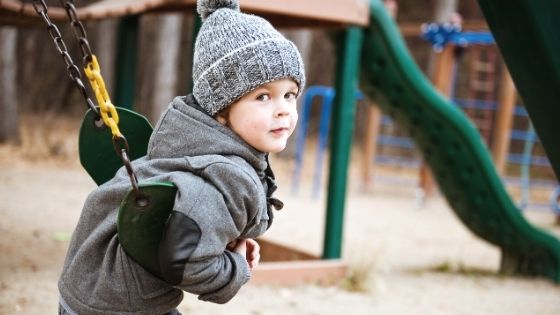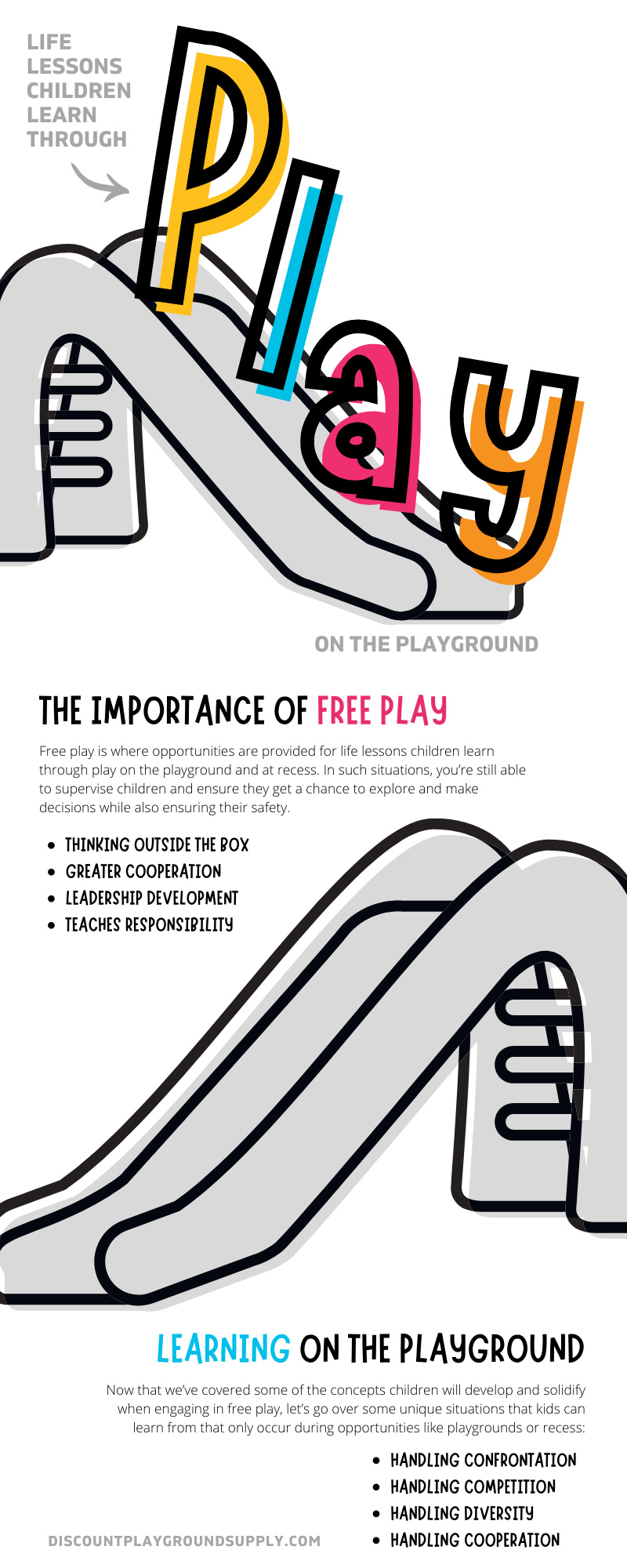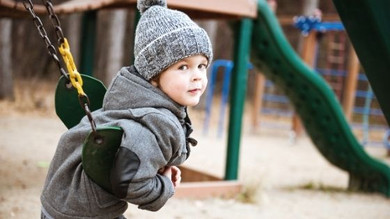
Playtime is a fundamental part of a child’s early years as they learn about and manipulate the world around them, they learn about the most basic cognitive, motor, and social skills that come second nature to us as we get older. Let’s look at some of the life lessons children learn through play on the playground so you can nurture such a formative period that will benefit them into their adult lives.
Structured vs. Free Play
The types of play kids experience can be separated into two categories: structured play and free play. Structured play is when there is at least one adult supervising or leading an activity or game, and because supervision is a matter of safety, kids get a lot more structured play than free play. Structured playtime examples may include family board game nights or educational games suggested and led by a teacher.
Free play, on the other hand, is when children get to engage in creative and play exercises without the intervention, initiation, or guidelines imposed by adults. While this doesn’t mean you can’t supervise your kids to ensure they’re safe, allowing kids to make decisions and decide how they want to play is what makes it free play. This is best exemplified by playgrounds and recess, where kids are allowed to do as they like as long as they maintain boundaries of safety.
The Importance of Free Play
While structured play is useful for offering guidance to kids and conveying concepts such as math and reading in the form of games and fun activities, it’s a mistake to neglect free play. Free play is where opportunities are provided for life lessons children learn through play on the playground and at recess. In such situations, you’re still able to supervise children and ensure they get a chance to explore and make decisions while also ensuring their safety.
Taking away free play opportunities like recess is a very real problem, with many schools considering reducing or eliminating recess. This is because they don’t realize how important such play is for cultivating creativity and problem-solving skills when kids are given the chance to be fully autonomous over an activity. Allow us to go a little deeper into the specific benefits free play offers:
- Thinking Outside the Box – With no clear guidance or instruction, kids will be given the opportunity to create their own solutions to problems they encounter, rather than mimicking a step-by-step guide of what is expected of them. Encouraging this freedom of thought helps kids establish their individuality and develop the ability to be independent in fulfilling their own needs and wants.
- Greater Cooperation – Without a clear structure of guidance or rules, kids must learn to cooperate with each other to establish rules of a game and hold each other to those rules. While structured play provides a reward or incentive for kids to follow rules, free play teaches kids how to play and cooperate without a reward. Instead, refusing to cooperate and play by rules established by peers will result in consequences like exclusion. To avoid these consequences, kids will instead learn to compromise.
- Leadership Development – A lack of structure also means a lack of adult leadership. Free play allows kids to have a chance to step up and assume a leadership position or divide up leadership roles amongst each other. These leadership roles can include deciding what rules are fair, mediating between disagreements, or playing referee. Leadership skills cannot be taught through structured activity, and a child must be able to independently step up and take authority.
- Teaches Responsibility – By being left to make their own choices, kids will learn they are accountable for themselves and their actions. The frontal lobe of the brain develops as children take risks and experience the consequences of that risk. Structured play is safe and mitigates risks by providing strict rules kids must adhere to, whereas kids may tackle ambitious tasks that prove too much for them, and they will have to learn about their own limitations and how to compensate for them during free play.
Learning on the Playground
Now that we’ve covered some of the concepts children will develop and solidify when engaging in free play, let’s go over some unique situations that kids can learn from that only occur during opportunities like playgrounds or recess:
- Handling Confrontation – It is inevitable that children will disagree or fight during play, and while any conflict would be swiftly handled by an adult during class time or at home, free play activities give kids the chance to handle their differences themselves, going back to the idea of assuming leadership roles and developing autonomy. This encourages kids to communicate, express themselves, and perhaps most importantly, compromise.
- Handling Competition – Competition is one of the most common forms of play, as it is natural for humanity as a whole. Competition on the playground will give kids the chance to learn how to lose gracefully and practice good sportsmanship, skills that will aid them in handling confrontation and conflict.
- Handling Diversity – Less controlled environments typically mean a more diverse exposure to other kids and people. Kids are separated by their age and ability in the classroom, but get the chance to mingle when they enter free play opportunities. Exposure to other children who are different from them will help them develop a wider and more accepting world view.
- Handling Cooperation – Structured play can have team activities, but this doesn’t necessarily nurture lessons of organizing and cooperating so much as it’s simply an obligation. On the playground, kids will have to learn how to organize themselves into teams for activities and competitions, as well as how to work with each other most efficiently to accomplish a common goal, rather than following the instructions given to them. In addition, this goes a long way in developing a child’s social skills, as they are able to make friends by finding commonalities.
How To Create an Enriching Playground
One way to create a playground that is enriching and provides plenty of opportunity within your school or community is by investing in a variety of equipment. The equipment doesn’t all have to be of major expense, however; for example, we have gaga ball pits for sale that provide kids with a safer alternative for games like dodgeball, while also being portable and easy to store away when not in use. Other equipment includes things like slides, swings, and monkey bars – you can’t beat the classics. If an open field can be incorporated nearby, it will make for excellent opportunities for kids to form their own team sports.


